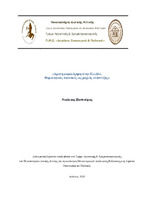| dc.contributor.advisor | Παπαηλίας, Θεόδωρος | |
| dc.contributor.author | Πατσούρας, Νικόλαος | |
| dc.date.accessioned | 2021-05-10T07:27:50Z | |
| dc.date.available | 2021-05-10T07:27:50Z | |
| dc.date.issued | 2021-01-08 | |
| dc.identifier.uri | https://polynoe.lib.uniwa.gr/xmlui/handle/11400/616 | |
| dc.identifier.uri | http://dx.doi.org/10.26265/polynoe-467 | |
| dc.description.abstract | Στη σύγχρονή εποχή, μετά τα προγράμματα διάσωσης και την επιταγή τους για υψηλά πρωτογενή πλεονάσματα και αυστηρή δημοσιονομική προσαρμογή, η φορολογική πολιτική ασκείται μέσω της επαύξησης των φορολογικών συντελεστών, ώστε να επιτευχθούν όσο το δυνατόν υψηλότερα έσοδα. Έτσι όλο και περισσότερο γίνεται λόγος για υπερφορολόγηση της Ελληνικής οικονομίας, για υπέρογκο βάρος των φόρων στο εισόδημα τον πολιτών και των επιχειρήσεων, για φορολόγηση που αποτρέπει τους επενδυτές κ.ο.κ.. Άραγε ισχύουν όλα αυτά και πόσο; Η παρούσα εργασία ασχολείται με την παρουσίαση των πιθανών εσόδων ενός κράτους μέσω των αμέσων φόρων και την επίπτωση τους στη μεγέθυνση της οικονομίας. Αρχικά, γίνεται παρουσίαση βασικών εννοιών της φορολογίας και τη διάκριση των φόρων. Επιχειρείται μία επισκόπηση των επιθυμητών χαρακτηριστικών δίκαιης φορολογίας και της θεωρίας της άριστης φορολογίας. Στη συνέχεια παρουσιάζεται το είδος φορολογίας αλλά και το μεγέθους των φορολογικών εσόδων της χώρας μας. Ανάλογη ανάλυση πραγματοποιείται και για τις χώρες-μέλη της Ευρωπαϊκής Ένωσης. Ακολουθεί η αποτύπωση των φορολογικών συστημάτων της Ελλάδας και κάποιων επιλεγμένων χωρών. Από την σύγκριση των βασικών μεγεθών και φορολογικών πρακτικών αναζητούνται πιθανές βέλτιστες φορολογικές πολιτικές. Εξετάζεται αν η μείωση των συντελεστών φορολόγησης θα οδηγήσει σε ανάλογη μείωση των εσόδων Ακόμη διερευνάται αν η μείωση συντελεστών φόρων αρκεί από μόνη της, για τη μεγέθυνση της Ελληνικής οικονομίας. Τέλος, μέσω εμπειρικής μελέτης, αναζητείται η αίσθηση των φορολογούμενων για τα κρίσιμα αυτά ζητήματα. | el |
| dc.format.extent | 213 | el |
| dc.language.iso | el | el |
| dc.publisher | Πανεπιστήμιο Δυτικής Αττικής | el |
| dc.rights | Αναφορά Δημιουργού - Μη Εμπορική Χρήση - Παρόμοια Διανομή 4.0 Διεθνές | * |
| dc.rights | Attribution-NonCommercial-NoDerivatives 4.0 Διεθνές | * |
| dc.rights.uri | http://creativecommons.org/licenses/by-nc-nd/4.0/ | * |
| dc.subject | Φόροι | el |
| dc.subject | Φορολογία | el |
| dc.subject | Φορολογική πολιτική | el |
| dc.subject | Φορολογικοί συντελεστές | el |
| dc.subject | Φορολογική συνείδηση | el |
| dc.subject | Φοροδιαφυγή | el |
| dc.subject | Φορολογική βάση | el |
| dc.subject | Ελλάδα | el |
| dc.subject | Ευρωπαϊκή Ένωση | el |
| dc.title | Άμεση φορολόγηση στην Ελλάδα. Φορολογικές πολιτικές ως μοχλός ανάπτυξης | el |
| dc.title.alternative | Direct taxation in Greece. Fiscal policies as a lever of growth | el |
| dc.type | Μεταπτυχιακή διπλωματική εργασία | el |
| dc.contributor.committee | Βαβούρα, Χαρίκλεια | |
| dc.contributor.committee | Στρόμπλος, Νικόλαος | |
| dc.contributor.faculty | Σχολή Διοικητικών, Οικονομικών & Κοινωνικών Επιστημών | el |
| dc.contributor.department | Τμήμα Λογιστικής και Χρηματοοικονομικής | el |
| dc.contributor.master | Δημόσια Οικονομική και Πολιτική | el |
| dc.description.abstracttranslated | In the current era, with rescue packages and the demand for primary surplus and strict financial controls, taxation policies are enacted through a number of accounting factors in order to achieve as high a profit as possible. Hence the talk of hyper-taxation of the Greek economy, of the immense weight of taxation on the income of citizens and companies, of taxation that prevents investment, etc. Is this the case? This dissertation is about the possible income of a country through immediate taxation and its consequences on the growth of the economy. Initially, there is a presentation of the basic terms of taxation and the distinction of types of taxes. A review of the desirable characteristics of fair taxation and the theory of optimum taxation is attempted. This is followed by a look at the types of taxation, as well as the amount of income generated through tax in our country. There is also a parallel analysis of EU members. Next there is a survey of the Greek tax system and those of selected countries. With the comparison of the scope of taxation practices, there is a review of possible optimum practices. It is also examined whether the reduction of taxation will lead to consequential income reduction. In addition, it is investigated whether the reduction of taxation factors alone is sufficient in order to strengthen the Greek economy. Finally, through an empirical study, it is examined how tax-paying citizens feel about these crucial questions. | el |


